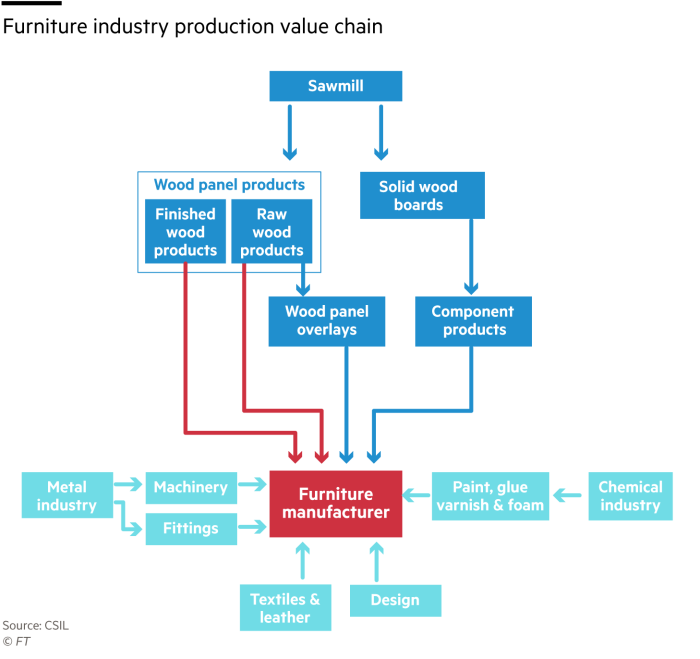[ad_1]
Furniture has been one of the biggest casualties of the global shipping and supply chain crisis as costs to transport a sofa or table are much higher than a pocket-sized iPhone or a pair of trainers.
In some instances, container costs for sofas, tables and chairs have risen as much as 1,200 per cent since the start of the pandemic, forcing furniture retailers to raise prices.
“If you think about the size of an iPhone and how many of those you could fit in a container and you think of the size of our things, the cost per product really does shoot up,” said Steve Carson, chief executive of UK- based sofa retailer ScS.
His company has paid as much as $20,000 per container to ship sofas from Asia to the UK during the pandemic compared with $1,500 before.
It means companies largely face an unenviable choice — absorb the extra costs and take a hit to profit margins or increase prices, which could weaken demand for their products.
So far, data shows the latter is happening with the price of home furniture in the UK rising 12.5 per cent in December on an annual basis, according to the Office for National Statistics.
The main problem for European and US retailers has been their reliance on China, which manufactures everything from cheap sofas and garden tables to flat-pack items made from chipboard. In the UK, furniture imports from China grew from $50mn in 1993 to $4.3bn in 2020, according to UN trade data.
The rocketing transport costs have prompted some European and US retailers to move some of their manufacturing operations closer to home and their customers, known as “nearshoring” or “reshoring”.
Sunderland-based ScS has increased its UK manufacturing from 50 per cent to more than 60 per cent of production in the past year.
“We’ve manufactured more from the UK because of the supply chain issues, the cost it drags in and because the lead times have been extended,” Carson said. “We’ll certainly continue looking at what more production we can move closer to home in the UK or Europe.”
UK-based furniture retailer DFS, which makes 40 per cent of its sofas in Britain, is also increasing the amount of automation in its domestic factories, citing benefits of higher quality, greater control over the supply chain and lower lead times.
Other European retailers, hit by long delivery times from Asia, have relocated production to countries nearer home such as Poland, Lithuania and Latvia, which have advantages because of the low cost of labour and access to raw materials such as wood.

“If you’re looking at nearshoring of wood products, then you’re looking at countries with a lot of forests,” said Aidan Conaty, a furniture sourcing agent.
Sweden’s Ikea, the world’s biggest furniture retailer, sources many of its goods from Poland, where a fifth of its products are made, and other countries nearby.
However, even Ikea has been forced to plug gaps in the availability of some of products by using trains and chartering ships from China.
Increasing geopolitical tensions because of the dispute between Russia and Ukraine has also made eastern Europe and the Baltics less appealing. In addition, in Poland there are concerns over product quality, said Conaty.
Denmark’s giant retail chain Jysk uses large distribution centres to stock goods close to its European customers, although it still maintains half of its production in China.
Peter Andsager, executive vice-president of purchasing at Jysk, said: “Our model is stronger in a volatile market thanks to our big distribution centres. We have something to absorb difficulties.”
UK-listed sofa retailer Made.com, hit by Vietnamese factory closures in last summer’s lockdowns, is another group using its domestic warehouses to tackle long lead times from orders to delivery.
The company, which makes 75 per cent of its products outside of Europe, is stocking up extra sofas in advance of orders to process deliveries within four weeks, rather than the six-to-seven week wait before the pandemic.

Reliance on warehousing also makes sense as shortages of skilled workers in areas such as upholstery in countries such as the UK can undermine attempts to move operations closer to home.
Already an estimated 50,000 UK jobs need filling against the 360,000 employed in the industry, according to Jonathan Hindle, chair of the British Furniture Confederation.
Other pressures include a reliance on imported materials, which can lead to supply problems, added Hindle. “We are in a very inflationary environment, with price increases across the board on steel, timber, fabric, particle board and foam,” he said.
However, the nearshoring trend has a long way to go, if it is to reduce its reliance on China, which enjoyed a 30 per cent surge in global furniture exports last year, according to Centre for Industrial Studies, a consultancy.

Mindaugas Morkunas, a former Ikea employee and head of sales in eastern Europe and the Commonwealth of Independent States at Henkel, the German chemicals group that supplies adhesive to furniture makers, fears the £500bn-plus industry is reaching a “tipping point” with rising prices at companies such as Ikea a potential threat to customer demand.
The Swedish group raised prices 9 per cent on average globally at the end of last year as it passed on some of its higher transport costs to the consumer.
“The challenge is how much more the customer can pay for furniture,” said Morkunas. More price increases could lead to less investment, financial losses and bankrupt smaller producers, he warned.
[ad_2]
Source link










